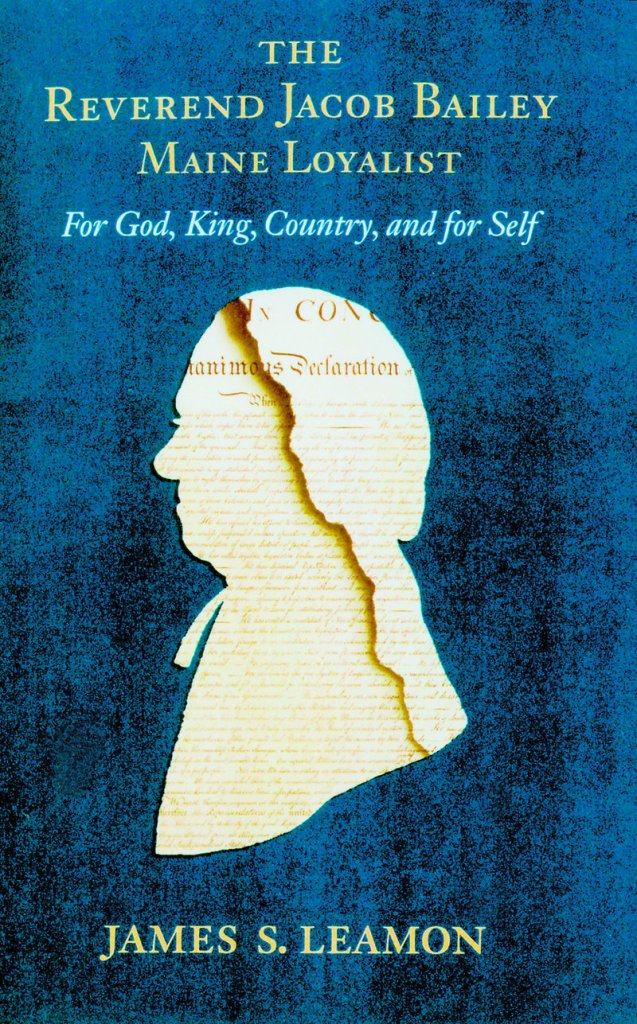The title of James S. Leamon’s superb new biography, “The Reverend Jacob Bailey, Maine Loyalist: For God, King, Country and For Self,” is accurate, though the word order of the subtitle may be open to rearrangement for some.
Parson Bailey (1731-1808) always held himself in high esteem, but almost certainly would have liked the subtitle because it postures him as an Anglican martyr true to his times. The reader is not so confident that Bailey would approve of Leamon’s portrait of him and his position in New England society, which materialized in large part due to a careful reading of the parson’s colorful papers and journals. Hoist by the honest recording of his own indiscretions and opinions, Bailey may have written too much to sustain his own privacy.
Leamon, professor emeritus of history at Bates College, did not set out to debunk or belittle Bailey but to learn about the man and through him the nature of English loyalists in the region. He succeeds by writing the finest Revolutionary War-era biography of a Maine individual to date.
Bailey himself was the object of William S. Bartlett’s biographical memoir, “The Frontier Missionary,” way back in 1853. A scholarly and sympathetic tome also based on Bailey’s papers, it enjoyed substantial regional popularity and was chosen in 2000 as one of 100 books that reveal the history of our place for The Mirror of Maine project (Baxter Society, UMO & Maine Historical Society).
Born a poor boy in Rowley, Mass., the awkward but “ambitious” Jacob proved a good student and was observed by the local Congregational minister, who was able to find enough patronage to get young Bailey into Harvard. In an era when status was everything in society, the church, education, politics and the Royal Navy, Bailey became a systems man. Because of his social ranking, he was at the bottom of his college class, no matter how well he did academically. But he moved up the ladder, becoming a schoolteacher, marrying well and studying for the Congregational ministry.
Though he started life as an unconfident bookworm, Bailey quickly enlivened his journals as quite the ladies man, bundling with a variety of village lasses, many of them his own students. His notes are spicy and graphic. In our day they would, no doubt, have led to dismissal if not jail time. Leamon is excellent at providing a social context and data on premarital sex in the 1700s.
When made a tutor to young women of a wealthy family, he quickly changed his tune, warning his charges against wanton young men and the dangers of bundling. He eventually married one of the wealthy daughters, a woman 15 years his junior.
The other great change was his switch from Congregationalism (with its Puritan roots) to Anglicanism (Church of England).
This entailed his traveling to London and becoming a priest. Bailey was virtually disowned by his birth family, classmates and the New England establishment, but lauded by his in-laws and a host of wealthy new patrons.
From here on he held an unbending view of the social order: the status quo. He took his place as parson at the missionary church in Pownalborough (now Dresden), serving faithfully from 1760 to 1779.
On the Maine frontier, Congregationalists were outnumbered and Bailey served Anglicans, Lutherans and even Catholics against an increasingly hostile social and economic background.
The parson’s attempt to stay Anglican, loyal and neutral eventually stretched to the snapping point and he was obliged to find a new life in Nova Scotia. The amazement of Loyalists when confronted by an inconceivable rebel victory and their loss of place was never more clearly expressed. This is a book for all Maine shelves.
William David Barry is a local historian who has authored/co-authored seven books, including “Maine: The Wilder Side of New England” and “Deering: A Social and Architectural History.” He lives in Portland.
Send questions/comments to the editors.



Success. Please wait for the page to reload. If the page does not reload within 5 seconds, please refresh the page.
Enter your email and password to access comments.
Hi, to comment on stories you must . This profile is in addition to your subscription and website login.
Already have a commenting profile? .
Invalid username/password.
Please check your email to confirm and complete your registration.
Only subscribers are eligible to post comments. Please subscribe or login first for digital access. Here’s why.
Use the form below to reset your password. When you've submitted your account email, we will send an email with a reset code.